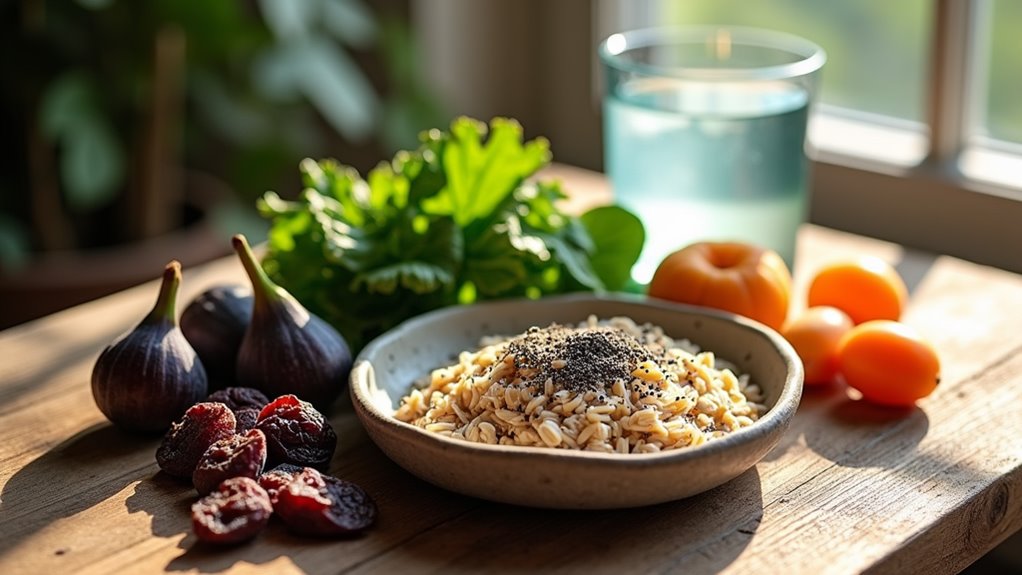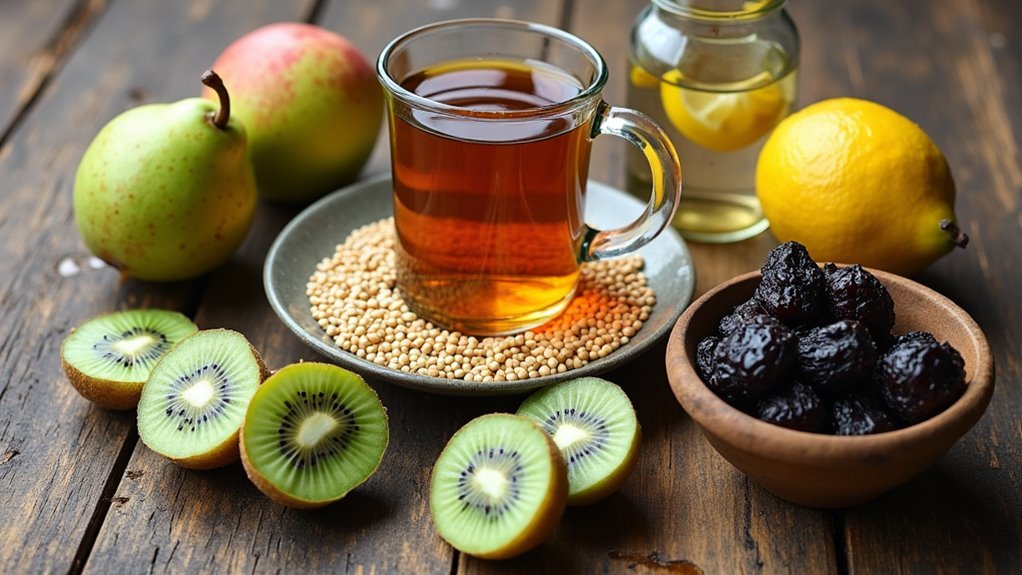The Ultimate Guide to Natural Constipation Relief
You can naturally relieve constipation by combining five key strategies. Start with fiber-rich foods like fruits, vegetables, and whole grains while drinking 8-10 glasses of water daily. Add 30 minutes of moderate exercise, such as walking or swimming, to stimulate your digestive system. Try gentle natural remedies like psyllium husk or senna leaf tea. When you’re ready to transform your digestive health, there’s much more to discover about these proven solutions.
Understanding the Root Causes of Constipation
While many people experience occasional constipation, understanding its root causes is essential for finding effective relief. You’re not alone in dealing with this common digestive issue, which often stems from lifestyle factors within your control.
The primary causes include insufficient fiber intake, dehydration, and a sedentary lifestyle. When you don’t consume enough fiber-rich foods or drink adequate water, your digestive system can’t efficiently move waste through your body.
Physical inactivity further slows down this process, making natural constipation remedies less effective.
Other factors that might be affecting you include stress, certain medications, and ignoring the urge to go. Disrupted sleep patterns, travel, and dietary changes can also throw your body’s natural rhythm off balance.
Dietary Changes for Better Bowel Movements
Making dietary adjustments can directly address many of the root causes we’ve identified. By focusing on fiber-rich foods, you’ll join countless others who’ve found relief through simple dietary changes.
Include plenty of fruits like apples, pears, and berries, alongside vegetables such as broccoli, carrots, and leafy greens in your daily meals.
You’ll want to stay hydrated by drinking at least eight glasses of water daily, as water works with fiber to keep things moving smoothly.
Replace refined grains with whole grain alternatives like brown rice, quinoa, and oats. It’s also helpful to add probiotic-rich foods to your diet, including yogurt, kefir, and fermented vegetables.
Remember to gradually increase your fiber intake to avoid discomfort, and listen to your body’s signals. Many people find success by eating meals at consistent times and never skipping breakfast, which helps regulate their digestive rhythm. Additionally, incorporating natural remedies such as ginger tea can provide soothing relief for digestive issues.
Essential Hydration and Fluid Guidelines
Ever wonder why staying hydrated is crucial for preventing constipation? When you’re dehydrated, your body pulls water from your colon to maintain essential functions, leaving your stool dry and difficult to pass.
You’ll want to make hydration a top priority in your daily routine, just like other health-conscious people do.
To keep things moving smoothly, follow these proven hydration guidelines that successful wellness advocates swear by:
- Drink at least 8-10 glasses of water daily, spacing them throughout your day rather than all at once
- Start your morning with warm lemon water to stimulate natural bowel movements
- Include hydrating foods like watermelon, cucumber, and celery in your diet
- Limit dehydrating beverages like alcohol, coffee, and sugary drinks, or balance them with extra water intake
Physical Activity and Exercise Solutions
Since regular physical movement stimulates intestinal contractions, exercise plays a vital role in relieving and preventing constipation.
You’ll want to incorporate at least 30 minutes of moderate activity into your daily routine, whether it’s brisk walking, swimming, or cycling. These activities help keep your digestive system moving naturally.
Try starting your day with gentle stretching or yoga poses that target your abdominal area.
Cat-cow poses, twists, and forward bends can massage your internal organs and promote bowel movements. If you’re sitting for long periods, take regular breaks to walk around and do light exercises at your desk.
For the best results, combine aerobic exercises with specific core-strengthening movements. Gentle stretches can also help promote gas release and ease discomfort during your routine.
Pelvic floor exercises and deep breathing techniques while exercising can enhance the benefits. Remember, you don’t need to become an athlete – even light movement throughout the day will help maintain healthy bowel function.
Herbal Remedies and Natural Supplements
When it comes to natural constipation relief, several herbal remedies and supplements can help stimulate bowel movements.
You’ll find these natural solutions are gentle on your system while effectively promoting regularity, just like many others in our natural health community have discovered.
Consider these proven herbal remedies and supplements to support your digestive health:
-
Psyllium husk powder mixed with water creates a gentle bulk-forming laxative that’s rich in beneficial fiber.
-
Senna leaf tea or supplements work as a natural stimulant laxative, typically producing results within 6-12 hours.
-
Magnesium citrate helps draw water into your intestines, softening stools and easing passage.
-
Aloe vera juice soothes your digestive tract while promoting regular bowel movements.
Start with small doses and gradually increase as needed, paying attention to how your body responds.
You’ll likely find that combining these remedies with proper hydration enhances their effectiveness in maintaining healthy bowel function.
Lifestyle Modifications and Daily Habits
Making simple lifestyle changes can dramatically improve your bowel regularity and overall digestive health.
You’ll find that establishing a consistent bathroom routine, ideally 20-30 minutes after meals, helps train your body’s natural rhythms. Stay hydrated by drinking at least eight glasses of water daily, and incorporate regular exercise into your schedule – even a 15-minute walk can stimulate bowel movements.
Your eating habits play a crucial role too. Start your day with a warm beverage, which can trigger your body’s gastrocolic reflex. Additionally, consider sipping clear liquids like broth or water to help maintain hydration, especially if you’re experiencing digestive discomfort.
When you’re eating, take your time and chew thoroughly. Focus on fiber-rich whole foods, but introduce them gradually to avoid discomfort.
You’ll want to maintain regular meal times and avoid eating late at night. Remember to listen to your body’s signals – never ignore the urge to go, as this can weaken your body’s natural response over time.
Frequently Asked Questions
Can Constipation During Pregnancy Affect My Baby’s Health?
Your baby’s health can be affected by severe constipation during pregnancy, as it may increase discomfort and stress. You’ll want to manage it promptly to protect both you and your little one.
How Long Can I Safely Use Natural Laxatives Without Causing Dependency?
You shouldn’t use natural laxatives for more than 1-2 weeks at a time. Even gentle remedies can create dependency, so it’s best to rotate methods and focus on dietary changes.
Why Do I Get Constipated More Frequently When Traveling?
You’re likely getting constipated while traveling because you’ve changed your regular routine, eating habits, and bathroom schedule. Plus, stress and dehydration during trips can slow your digestion down.
Is Chronic Constipation Linked to Weight Gain or Difficulty Losing Weight?
You’re not alone – chronic constipation can indeed lead to weight gain and make losing weight harder. It affects your metabolism, causes bloating, and can disrupt the gut bacteria that regulate weight.
What Are the Warning Signs That Constipation Requires Immediate Medical Attention?
You’ll need immediate medical help if you’re experiencing severe abdominal pain, blood in stools, constant vomiting, unexpected weight loss, or if your constipation lasts more than three weeks.





